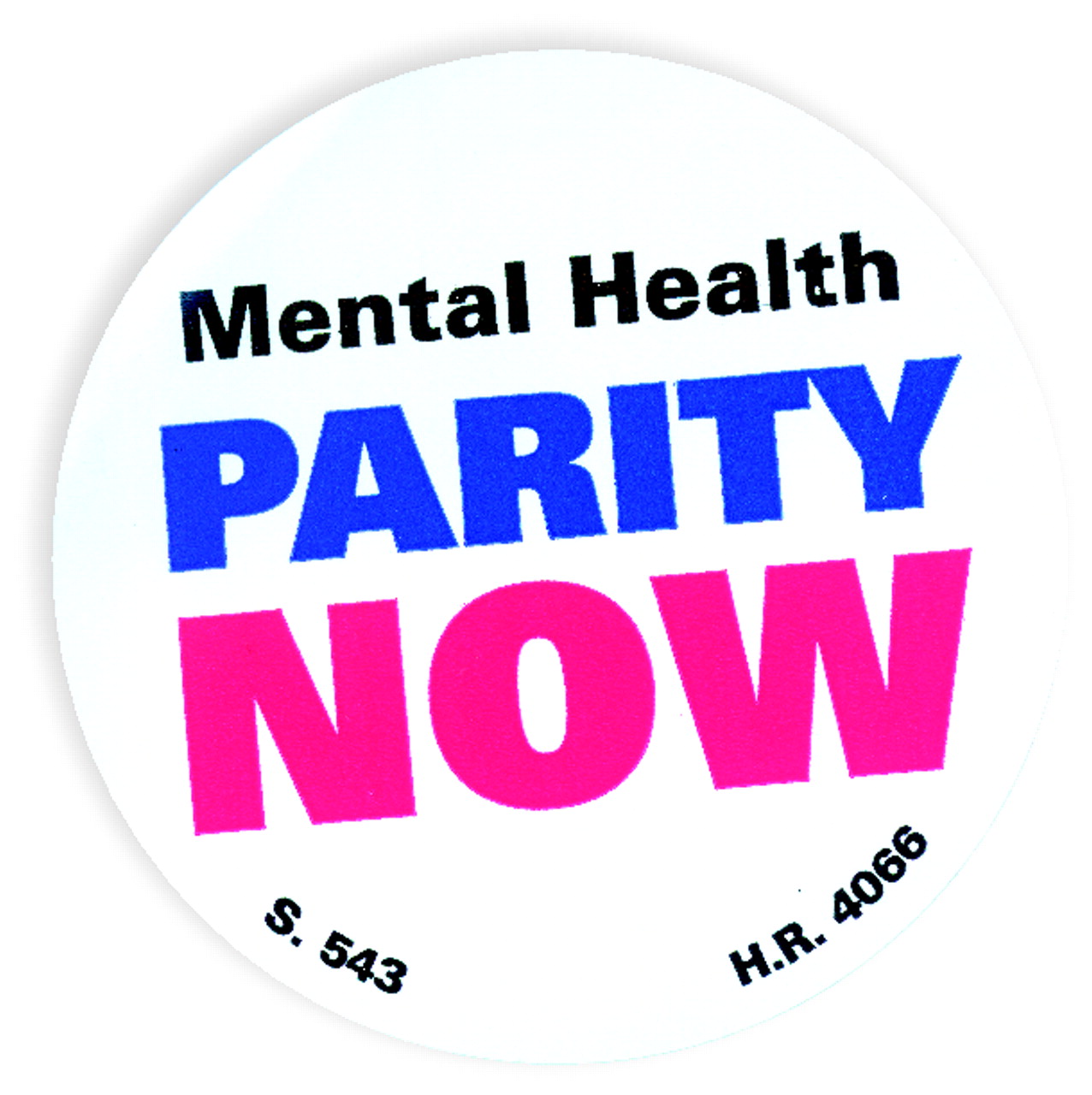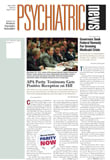Compelling testimony by APA’s Darrel Regier, M.D., M.P.H., helped cement the support of the House Energy and Commerce Subcommittee on Health last month in the legislative battle to pass the Mental Health Equitable Treatment Act of 2002 (HR 4066). The bill was introduced earlier this year by Reps. Marge Roukema (R-N.J.) and Patrick Kennedy (D-R.I.).
HR 4066 has 240 cosponsors in the House, and its Senate companion, S 543, introduced by Sens. Paul Wellstone (D-Minn.) and Pete Domenici (R-N.M.), passed that chamber last year with more than 65 cosponsors.
In April President Bush urged Congress to send him a parity bill to sign by the end of this legislative session (Psychiatric News, May 17). The House bill is being considered by the Energy and Commerce Committee, as well as the Committee on Education and the Workforce. The latter committee held hearings on the bill in March (Psychiatric News, April 19).
Last month’s three-and-a-half-hour hearing was opened by Health Subcommittee Chair Rep. Michael Bilirakis (R-Fla.), acknowledging that the key arguments expressed by parity opponents center on the high cost of covering all mental illnesses specified in DSM-IV-TR, as would be required under the language of the proposed legislation.
“I do believe that some mental conditions, just like some physical conditions, do not warrant equal treatment by a health plan,” Bilirakis said. “However, I want to be clear on this issue—I think that serious mental illness is a problem that deserves serious attention. But I also think we need to be careful with our limited health care resources.”
Bilirakis then challenged the witnesses invited to testify to present information that would help the subcommittee members reach agreement on the issues of cost and extent of coverage—whether parity should be limited to only “serious mental illness” or available for coverage of all DSM-IV-TR disorders.
In their opening comments, Rep. Charles Norwood (R-Ga.) called the parity legislation “a reasonable approach,” and Rep. Sherrod Brown (D-Ohio) termed it “an effective compromise responsive to the concerns of employers,” noting that “there’s a big difference between managing benefits and shortchanging patients.”
What followed was a hearing punctuated by harsh questions from committee members to witnesses testifying against parity. Most of the subcommittee members, Bilirakis noted, are cosponsors of HR 4066.
How Much Does It Cost?
The Congressional Budget Office (CBO) clarified in a July 12 memo its previous estimate that parity would result in an average increase of 0.9 percent in health plan premiums.
CBO noted that many plans would experience no additional cost, either because their health plans already meet the requirements of the bill or because they do not offer any mental health benefits, thus being exempt from parity requirements. However, CBO said that those plans that offer some mental health benefits and use “benefit design elements that would be prohibited under the bill” could experience greater cost increases to provide those benefits under the proposed legislation. “We estimate that. . .affected plans would experience an increase of between 30 percent and 70 percent in their mental health costs,” stated the CBO memo.
Charles M. Cutler, M.D., chief medical officer of the American Association of Health Plans, which represents group health plans covering approximately 170 million people nationwide, immediately discounted the CBO estimate of 0.9 percent, saying that it does not “reflect the true costs of the bill.”
Cutler cited other studies showing average cost increases of 3 percent to 4 percent. He argued that covering all disorders recognized in DSM would significantly inflate these numbers, causing treatment for conditions such as “jet lag” and “caffeine intoxication” to be subject to payment.
‘Red Herring’ Arguments Shot Down
APA’s Regier testified next. He countered that the cost of not covering mental health benefits is even more expensive to American consumers and businesses.
In fact, Regier said, lack of parity is “a market failure that allows insurers to ‘race to the bottom’ in an effort to avoid risk”—a reference to plans that opt to offer minimal, cut-rate benefits at the lowest cost and risk to the plan.
“This is the antithesis of the free market and penalizes responsible employers who cannot take advantage of competition. Insurers may profit in the short term, but businesses and the public sector are clearly burdened.”
Regier strongly countered attacks on DSM, calling them “red herrings.” The attacks, he said, focus on peripheral conditions and falsely assert that parity would result in an explosion of claims for such conditions.
“Parity opponents know full well,” Regier testified, “that DSM requires evidence of clinically significant impairment that would be fully protected under the House and Senate parity bills. The debate over DSM is palpably false and designed to distract Congress from the real issue: blatant insurance discrimination against patients with mental illness.”
Regier was followed by Neil Trautwein, director of employment policy for the National Association of Manufacturers. Trautwein not only argued that HR 4066 is too expensive and would result in mandated coverage of conditions that “have no basis in medical science,” but also pointed out that the medical-necessity provisions of the bill would result in increased litigation surrounding denied claims.
Following Trautwein, James Hackett, president of Houston-based Ocean Energy, testified that his company, along with a large realty investment company and the Houston Chronicle, implemented full parity for DSM disorders in the last year.
“Each of us,” Hackett said, “has estimated that any increase in cost due to parity will be minor and more than offset by avoided costs of lost employee productivity.”
He urged the subcommittee to support the bill. “While I personally believe as a business leader that providing mental health benefits on par with physical health benefits makes not only economic but moral sense, there is a need for governmental intervention to end insurance discrimination against mental illness,” he said
Bilirakis began the questioning period of the hearing by submitting to Regier a set of written questions, asking APA to provide the subcommittee with written answers as soon as possible.
Cutler and Trautwein were harshly questioned by several members, including Norwood, who tried repeatedly to get Cutler to describe the mental health benefits in a typical plan offered by his association’s members. Cutler responded that 96 percent of the members already provide some mental health coverage, but was evasive when pointedly questioned to describe the actual coverage, saying only that HR 4066 would significantly increase costs.
“If 96 percent of your member plans are covering it, what you’re testifying to,” Norwood argued, “is that you ain’t covering it very well!”
Rep. Anna Eshoo (D-Calif.) sternly rebuked both Cutler and Trautwein when she believed they were being evasive in answering questions regarding whether they supported the fundamental concept of parity.
“Just answer the question for the record, yes or no—although your answer may be uncomfortable for you, and it must be, because I don’t think your stand is one that the American people in business today support—and that is, you are for disparity,” she said. “We’re here today trying to move things into the equal column, and from your testimony, what we can make of it, you are for disparity.”
Chances for Passage
Bilirakis concluded the day’s hearing with comments that were optimistic, yet guarded.
“I think that the feelings and position of the members of the committee are pretty evident here today, and that is a definite willingness to work on this subject,” he said. “I am optimistic we can do so with a mind toward compromise.”
APA Division of Government Relations Director Jay Cutler, J.D. (no relation to AAHP’s Cutler), later summed up his impression of the hearing. He said that he was optimistic but mindful of the existing challenges to the bill’s passage.
“There were clear signals at the hearing that reinforced a strong interest in wishing to pass legislation this year, if an acceptable legislative compromise could be worked out,” he said. “We must recognize that politics is the art of compromise, and psychiatry is exquisitely aware that the devil is in the details.”
With limited time remaining on the legislative clock this year, he said, getting an acceptable compromise to Bush for his signature would be “most challenging.”



